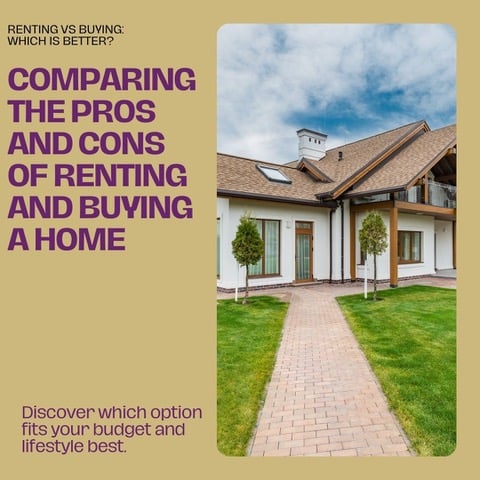The choice between buying a home and renting is a big financial decision with myriad practical implications for your life. It's not just about comparing rent vs. mortgage payments – it's about understanding how each choice fits into your lifestyle and plans. At Walston Group, we strive to help our clients understand what options suit them best and guide them in a direction that meets their goals. Here is a breakdown of the basics of renting versus buying in straightforward terms; whether you're a first-time renter or considering homeownership, we have simplified the complexities of this important decision.
Exploring the Differences:
Let's start by understanding the fundamental differences between renting and buying. When you rent a home, you're essentially paying a monthly fee to live in a space owned by someone else. Just like leasing a vehicle, it is yours to use while you are leasing it but you never have ownership and your lease may increase over time. Renting does offer flexibility – you can move more easily and typically aren’t responsible for maintenance costs. On the flip side, buying a home means taking on a mortgage, but it also grants you ownership. While you'll be responsible for repairs and upkeep, the property becomes an investment that can appreciate over time.
Financial Considerations:
From a financial perspective, renting often requires less upfront investment. Security deposits and perhaps the first month's rent are generally all that's needed. Purchasing a home involves a down payment, closing costs, and ongoing mortgage payments. However, these payments contribute to building equity. Over time, this equity can grow, especially if the property value increases. Building equity is like putting money into a long-term savings account, providing a valuable asset that can be tapped into through home equity loan or appreciation when selling the property.
Flexibility vs. Stability:
Renting provides the flexibility to change locations easily, ideal for those with dynamic lifestyles or uncertain futures. Buying, on the other hand, offers stability and the chance to put down roots in a community. The decision depends on your current life stage and future plans.
Considering Maintenance and Improvements:
Renters often enjoy the perk of having landlords handle maintenance issues, freeing them from unexpected repair costs. However, you are often limited on the changes you can make to the interior of the property. Homeowners are responsible for upkeep, which can be both a financial and time commitment. You also have the freedom to personalize your living space, whether it’s painting walls, renovating, or adding landscaping, you have the authority to make changes. It's important to weigh the convenience of calling a landlord versus having the freedom that comes with maintaining your own property.
Here are some important questions to ask yourself when weighing your options:
1. Are you in a good financial position to buy?
Things to consider:
- Your income: If you don't have stable, sufficient income, it might not be the right time.
- Your down payment: The type of loan you use will dictate the amount of down payment required; most loan programs include some level of financial contribution from the borrower.
- Your credit score: The higher your credit score, the more favorable terms you will be able to secure for a loan.
- Your other debts: A common guideline is your total monthly debt payments shouldn't exceed approximately 40% of your pretax income. If you have other debt, there may be less room in your finances for mortgage payments.
2. Will you stay in your home for at least a few years? This is financially important for a number of reasons, including the one-time expenses you incur when purchasing a home such as mortgage fees, appraisal and inspection fees. The longer you stay in your home, the more time you have to spread out those costs while your home potentially rises in value.
Things to consider:
- If you're planning to stay less than 3 years, it may not make financial sense to buy. Your home may not appreciate quickly enough for you to recoup selling costs.
- Staying less than 2 years can come with particular tax disadvantages as you may not qualify for a capital gains tax exclusion if you realize a substantial gain on the sale of your home.
3. Does renting or buying offer better value in your area? Many assume buying is better because it allows you to build equity in your home; this may not necessarily be true if rents are relatively low compared to purchase prices in your area.
Things to consider:
When comparing, first make sure you're looking at similar properties in the same area (i.e., don't weigh renting a studio apartment against buying a country cottage). You can compare renting and buying by evaluating the following:
- The price-to-rent ratio: Take a monthly rent figure and multiply it by 12, so it's an annual number. Divide the purchase price of a similar property by that annual rent number. A ratio greater than 20 generally weighs in favor of renting, while a figure less than 20 generally favors buying.
- Use an online rent vs. buy calculator: There are many useful online calculator tools to help you break the numbers down. Just plug in the rent and purchase figures, plus your down payment and income into the calculator and it will crunch the numbers for you.
There are many important factors to weigh when deciding whether to rent or buy. Selecting the right real estate professional to help you understand the local market, evaluate your options, and choose the right mortgage provider is crucial to making this important financial decision. The experienced professionals at Walston Group Real Estate can help you navigate the complexities of renting vs. buying, whether you are a first-time homebuyer, a growing family, or a budget-conscious retiree. Call us today if you want help to begin your homeownership journey!

